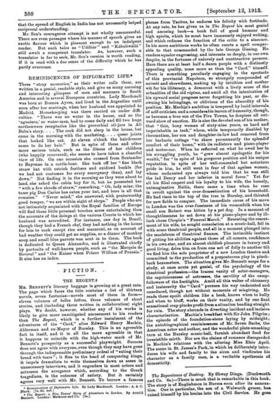- FICTION. -
THE REGENT.t
Ma. BENNETT'S literary baggage is growing at a great rate. The page which faces the title contains a list of thirteen novels, seven fantasias—novels most of them in form— eleven volumes of belles lettres, three volumes of short stories, and (including three written in collaboration) eight plays. We doubt, however, whether any of his works is likely to give more unmitigated amusement to his readers than The Regent, which is a further instalment of the adventures of the "Card," alias Edward Henry Machin, Alderman and ex-Mayor of Bureley. This is an agreeable fact in itself, and it is all the more agreeable in that it happens to coincide with the high-water mark of Mr. Bennett's prosperity as a successful playwright. Success does not agree with everyone, even though they may have gone through the indispensable preliminary ordeal of "eating their bread with tears "; it flies to the head of conquering kings, it impels dramatists to write themselves down as asses in unnecessary interviews, and it engenders in most actors and actresses the arrogance which, according to the Greek tragedians, is the outcome of satiety. But it certainly agrees very well with Mr. Bennett. To borrow a famous • Remini,„„ce, of Diptomaite Lift. By Lady Kacdonell. London : A. & C. lack. [7s. 60. net.] t The Regent a Fire Towns' Story of Adrenture in London. By Arnold Bennett. London: Methuen and Co. [6e.] phrase from Tacitus, he endures his felicity with fortitude- At any rate, he has given us in The Regent his most genial: and amusing book—a book full of good humour and high spirits, which he must have immensely enjoyed writing, and which reduces the function of the critic to a sinecure. In his more ambitious works he often exerts a spell compar- able to that commanded by the late George Gissing. He renders squalor engrossing, and interests us deeply, in our own despite, in the fortunes of unlovely and unattractive persons. Here there are at least half a dozen people with a distinotly appealing quality, none more so than the "Card" himself. There is something peculiarly engaging in the spectacle of this provincial Napoleon, so strangely compounded of naiveté and shrewdness, making up by intuition and mother wit for his illiteracy, a democrat with a lively sense of the urbanities of the old regime, and amid all the intoxication of
his upward social progress never forgetting his past, or dis- owning his belongings, or oblivious of the absurdity of his position. Mr. Machin's ambition is tempered by lucid intervals of self-criticism and a considerable leaven of humanity, though, as becomes a true son of the Five Towns, he despises all out- ward show of emotion. He is also the devoted son of his mother, that "thin, bony woman of sixty-nine years, as hard and imperishable as teak," whom, while temporarily disabled by rheumatism, her son and daughter-in-law had removed from her barbaric cottage "to share permanently the splendid comfort of their home," with its radiators and piano-player
and motor-car. When he reflected on what he owed her in
his struggling youth, he "grew almost apologetic for his wealth," for "in spite of his gorgeous position and his unique reputation, in spite of her well-concealed but notorious pride in him, he still went in fear of that ageless woman, whose undaunted eye always told him that be was still the lad Denry and her inferior in moral force." Yet for all his filial respect and his loyalty to his wife, the homely, unimaginative Nellie, there came a time when be rose in revolt against the over-domestication of his household.
He had risen to the top of the tree in Bursley, and thirsted for new fields to conquer. The immediate cause of his move to London was the over-fussiness of his womenfolk when his small son Robert was bitten by a pet dog. In a moment of thoughtlessness he sat down at his piano-player and by ill- luck chose Chopin's "Funeral March." Resenting the resent-
ment of his wife, he sought consolation at a music-hall, fell in
with some theatrical people, and all in a moment plunged into
the maelstrom of theatrical finance. The invincible instinct of pitting his abilities against those of all comers, confidence in his own star, and an almost childish pleasure in luxury and good living, drive him on from one act of folly to another till we find him the sole proprietor of a new London theatre and. committed to the production of a preposterous play in pinch- beck hexameters. The situation gives Mr. Bennett scope for a study, at once acute yet genial, of the psychology of the theatrical profession—the brazen vanity of actor-managers, the capriciousness of actresses, the servility of the camp- followers of the footlights. Amid all this welter of chicanery and insincerity the "Card" pursues his way undaunted and unseduced, though not without moments of misgiving. He reads these spoilt children like a book, knows when to bully and when to bluff, works on their vanity, and by one final sensational coup plucks profit from a situation heading straight for ruin. The story abounds in diverting incident and incisive characterisation. Machin's breakfast with Sir John Pilgrim; the episode of the foundation-stone laying by midnight; the autobiographical reminiscences of Mr. Seven Sachs, the American actor and author, and the wonderful plate-smashing turn at the Bursley music-hall, furnish abundant food for irresistible mirth. Nor are the &aims of romance disregarded in Machin's relations with the alluring Miss Elsie April. The scene in St. James's Park, in which he deliberately intro- duces his wife and family to the siren and vindicates his character as a family man, is a veritable apotheosis of domesticity.










































 Previous page
Previous page